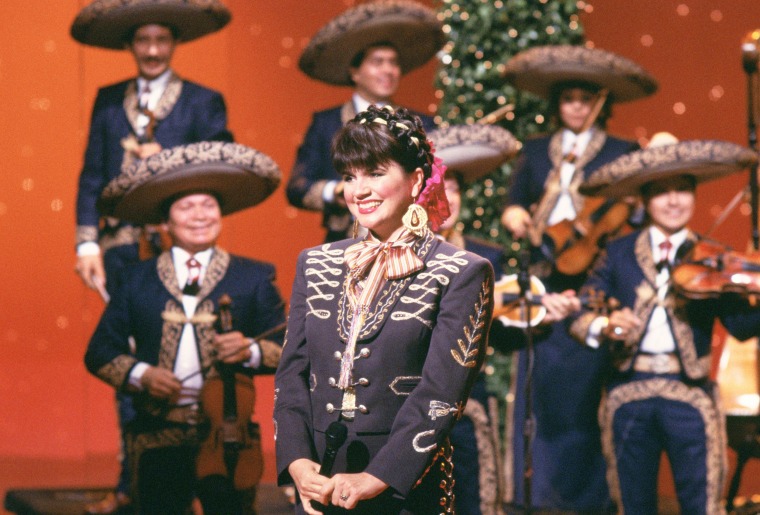Defining records from Ricky Martin, Linda Ronstadt and the Buena Vista Social Club have been inducted into the National Recording Registry, the Library of Congress announced.
Martin’s Latin pop megahit “Livin’ La Vida Loca,” Ronstadt's Spanish-language traditional Mexican music album “Canciones de Mi Padre” and the debut album of the Cuban music ensemble Buena Vista Social Club are among the 25 records and albums that were added this year to the nation’s audio history library for preservation.
Ronstadt's hits in the 1970s included “You’re No Good,” “Blue Bayou” and “Hurt So Bad.”
Before retiring in 2009 after she was diagnosed with progressive supranuclear palsy, a rare and incurable brain disorder similar to Parkinson’s, Ronstadt sang everything from new wave and rock to country ballads, opera and rancheras — a popular Mexican folk music genre.
In 1987, despite her music label’s disapproval, Ronstadt released her ultimate passion project, “Canciones de Mi Padre,” as a tribute to the songs she learned from her father and to her Mexican American heritage.
“I learned a lot of my singing from Lola Beltrán,” she previously told NBC News, speaking about one of Mexico’s most acclaimed ranchera singers. “Mexican music was a tremendous influence on my singing style."

Her father, Gilbert, knew a lot of beautiful Mexican love songs that were passed down to him by Ronstadt’s grandfather Federico, who was born in Sonora, Mexico, in 1868 to a German father and a Mexican mother.
Recorded alongside four distinguished mariachi bands, the canciones album introduced mariachi music to countless new listeners. The album sold over 2.5 million units and became the nation's biggest-selling non-English recording in history, according to the Library of Congress.
It also went double platinum and won a Grammy for best Mexican American performance. The album's success effectively helped pave the way for artists like Selena Quintanilla and Gloria Estefan in the 1980s, as well as others, like Ricky Martin, Shakira and Jennifer Lopez, who became the central figures of the Latin music explosion during the 1990s and the 2000s.
The canciones from that album were also the last ones she sang at her last live concert in November 2009 before officially retiring.
“I come from the Sonora desert, which exists on both sides of the border," Ronstadt, who was born in Tucson, Arizona, told NBC News in 2020. "I’ve always felt very deeply affiliated with Mexican American culture.”
Indelible Cuban sounds, a Puerto Rican pop sensation
Nearly a decade after "Canciones de Mi Padre," an ensemble of 20 Cuban musicians came together as the Buena Vista Social Club with the help of British music executive Nick Gold, American guitarist Ry Cooder and Cuban bandleader Juan de Marcos to record key Cuban musical styles such as son, danzón and bolero.
"People just fell in love with that music," Gold told NBC News in 2016 ahead of the band's last concert in Havana.
As their 1997 debut album gained popularity, it helped fuel the ongoing resurgence of Cuban and Latin music at the time, according to the Library of Congress. The band then went on to play in Amsterdam as well as in New York’s Carnegie Hall.
The story behind the band is also the subject of a 1999 documentary by German filmmaker Wim Wenders, which was inducted into the National Film Registry two years ago.
On the heels of the Buena Vista Social Club's success, Ricky Martin's bilingual smash hit "Livin' La Vida Loca" would blow up the music charts and pave the way for the globalization of Latin pop before music streaming services changed the music industry.
Puerto Rican singer-songwriter Draco Rosa, who co-wrote the 1999 global hit alongside Desmond Child, said he believes "that the energy of a movement is what dominates in that song about Latinos, the empowerment of Latinos.”
“Life is full of great suffering, and ‘La Vida Loca’ is the total opposite," Rosa said in a statement.
The song became the No. 1 hit in 20 countries and was certified platinum in the U.S., the United Kingdom and Australia, according to the Library of Congress. It remained at No. 1 on the Billboard Hot 100 for five consecutive weeks and won record of the year at the 42nd Grammy Awards.

Rosa and Martin had previously worked together on the 1998 hit "La Copa de la Vida" (The Cup of Life), which became the official song of the 1998 FIFA World Cup in France, and as bandmates in the famous teen group Menudo.
Librarian of Congress Carla Hayden said in a statement Wednesday the contributions of these Latino artists are "audio treasures worthy of preservation for all time based on their cultural, historical or aesthetic importance in the nation’s recorded sound heritage."
They join a sound collection of nearly 4 million items, 600 of which are titles listed in the National Recording Registry, Hayden said.
“The national library is proud to help preserve these recordings,” she said.
Follow NBC Latino on Facebook, Twitter and Instagram.

